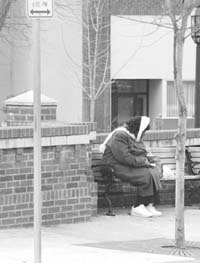Living On The Edge
 |
| photo by Cathryn Shaffer |
According to the Employment Security Commission of North Carolina, the state\’s current unemployment rate has dropped to 4.3%, below the national average and its lowest point since December 2000. However, working people who earn average wages know that the cost of living far exceeds the wages paid for labor. In addition, one of the most discussed issues amongst local organizations and community groups is the minimum wage bill, currently waiting approval in the NC legislature. Several community leaders are joining the living wage movement to require that local policymakers adjust the minimum wage to meet the real cost of living.
The
current minimum wage in North Carolina is $5.15 per hour, the same as
the federal minimum. That is significantly below the living wage, which
is about $11 per hour for a single worker living in Asheville. Adding
the costs of raising a family, health care, food, and housing raises
the living wage to about $15 per hour.
Last
year the NC legislature failed by two votes to pass legislation that
would increase the state\’s minimum wage to $6.15 per hour. A revised
bill, which would increase the minimum wage to $6 per hour, has passed
the state House, but it still needs to pass the Senate and be signed by
the Governor to become law.
According
to the NC Justice Center, the federal minimum wage was last increased
over a two-year period from $4.25 in 1995 to $5.15 in 1997. Bob Smith,
Executive Director of the Asheville-Buncombe Community Relations
Council, is very concerned with wage stagnation. “The minimum wage is
at the whim of Congress, and it\’s been seven or eight years [actually
almost 10] since it\’s been changed. That itself is a whole other issue.
Asheville has a very high cost of living, and working people are
suffering,” Smith said.
A
number of organizations are banding together to create a living wage
campaign in Asheville and Buncombe County, echoing a statewide
coalition called the NC Fair Wages Campaign. Melissa Fridlin of Working
Families Win, and Mark Siler and Tyrone Greenlee of Christians for a
United Community, are working with area activists to join the wage
coalition. Several meetings have been held to come up with some
possible solutions for the plight of the working class. On Feb. 28,
2006, the group came up with an approach that would create a committee
of community members, labor representatives, and a variety of local
non-profits are working together to support the minimum wage bill.
At
a Feb. 21 meeting, the Buncombe County Board of Commissioners discussed
the living wage and job benefits. While nothing was set in stone,
commissioners considered ways to create more jobs with benefits and
increased wages by making some changes to the current business
incentives program. The board then voted to strengthen its current
policy and create more jobs by refocusing their incentives for local
businesses.
Smith
also points out that “People on the [Asheville City] Council are aware
that you cannot live on the minimum wage in Asheville. Realistically,
all they can do is look at the city jobs and make sure people working
for the city are being paid enough to live,” he said. “I know that the
mayor is concerned with city workers being able to live in the city.”
In
1997, the organization NC Equity, which works for the economic strength
of women and families through public policy, research and education,
published a “self-sufficiency standard” for North Carolina. Covering
all 100 counties in NC, the standard considered costs of food,
childcare, health care, and housing, and determined that federal wage
guidelines were not adjusted to the cost of living.
This
standard is still used today to illustrate the need for higher wages
and explains the growing number of workers in need of subsistence.
“There\’s not much for a single person working a minimum wage job,” adds
Smith. “There are food stamps, which are getting harder and harder to
receive; public housing subsidy, which works under the Section 8
voucher; a special insurance policy for kids whose parents receive a
low income, or you have to live with a friend or relative just to get
by. It\’s a difficult situation,” said Smith.
Smith
also leads the Asheville-Buncombe Fair Housing Commission, which works
with victims of housing discrimination and holds ongoing conversations
with the housing community and the people in need of reasonably priced
shelter. Although Smith has made some headway in addressing the link
between poverty and the living wage, his current program, like many
others across the country, is itself facing budget difficulties.
“Programs for the poor have suffered from the recent hurricane, the
war, deficit… money has been diverted from those programs to help the
immediate needs of those affected by these recent devastations,” Smith
continued. “We\’ve had our budget cut $100,000 because of the hurricane.
Those people need the help, but the issue of fair housing in Asheville
is just getting worse.” said Smith.
In
addition, the NC Low Income Housing Coalition, whose mission is “to
work for decent, safe, and affordable housing opportunities that
promote self-determination and stable communities for low-income
families,” says the need for higher wages is directly related to the
growing trend of unaffordable housing in NC. According to their study,
a full-time worker in the state, on average, would have to make $10.15
per hour to rent a 2-bedroom apartment.
Business
lobbies insist that raising minimum wages would cause small businesses
to lay off workers, though there\’s no evidence to support the claim,
despite years of studies. But the direct benefits of an increase in the
minimum wage are clear to most people; national data compiled from the
NC Justice Center show that if the minimum wage increased to $7 per
hour over two years, the bottom 40% of households (by wages and salary)
would receive nearly 60% of the gains.
A
statewide increase to $6.00 from the current federal minimum of $5.15
would reflect a 16.5% increase, nine years after the minimum wage was
last raised. Given that housing prices in the Asheville area have
increase more than 40% in just the past four years, and that the price
of gas has doubled since last summer, the NC Senate and Governor should
have no qualms about increasing the minimum wage. Otherwise, the
legislature may find that working people are fleeing to states with
better incomes and a more reasonable cost of living.







